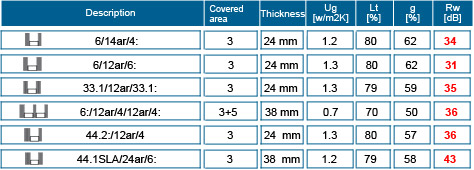SOUNDPROOFING GLASS - DATA SHEET


The Rw coefficient (dB) The acoustic attenuation index is relevant for the acoustic properties of a glass.
It shows the difference in sound levels on both sides of the glass, for a normalized noise spectrum
(for example road noise). A high value indicates a good soundproofing.

In the above charts you can see the impressive effect of sound waves absorption for a laminated glass with simple PVB foil, respectively with Acoustic PVB foil.
How does it work?
There are five factors that contribute to a soundproof window:
There are five factors that contribute to a soundproof window:
Glass mass
Asymmetric structure
Distance between glass
Gas environment
Using laminated glasses
Asymmetric structure
Distance between glass
Gas environment
Using laminated glasses
- if the glass is thicker, the sound insulation is better
- the glass sheets must have different thicknesses
- if the space between the glass sheets is larger, the glass is more efficient
- replacing air with argon increases soundproofing performance
- the glass laminated with PVB foil or with Acoustic PVB (SLA) foil dampens sound waves better than monolithic glasses
- the glass sheets must have different thicknesses
- if the space between the glass sheets is larger, the glass is more efficient
- replacing air with argon increases soundproofing performance
- the glass laminated with PVB foil or with Acoustic PVB (SLA) foil dampens sound waves better than monolithic glasses
